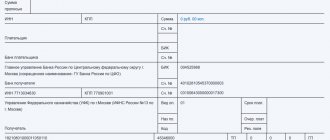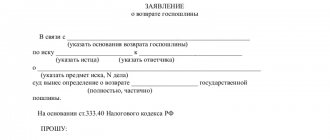The state fee is paid for the performance of legally significant actions, for which companies apply constantly and without fail, starting with the registration of their own activities. Individuals also quite often make such payments for certain services of government bodies. In some cases, specifically specified in regulations, organizations or individuals are faced with the need to return the paid amount of state duty in full or in part.
Question: By a court decision, the state duty was recovered from the losing party. Should the plaintiff - LLC (USN, “income”) include in income the amount of state duty received from the defendant? Is state duty returned from the budget included in income when the defendant is the tax authority? View answer
When and how can this be done? In what situations can a state duty refund not take place? What do taxpayers need to do to achieve this? How to correctly record these amounts in accounting? Let's figure it out together.
What state fees do legal entities and individuals pay?
The budget receives certain amounts through the appeal of organizations and individuals to government agencies for carrying out actions with legal consequences.
Question: Is it possible to return the state fee in case of refusal to register a lease agreement? How is this duty reflected in tax accounting depending on the result of registration of the agreement? View answer
Basic fees for organizations
Organizations constantly contribute certain funds to the budget as state duties. The amounts and timing of these deductions vary and depend on the type of activity of the company and the nuances of its functioning. Conventionally, duties paid by legal entities can be divided into 3 groups:
- Organizational expenses:
- registration of activities;
- amendments to the Charter;
- issuance of licenses;
- applying for permits;
- registration of certificates;
- ordering an urgent extract from the Unified State Register of Legal Entities;
- certification of contracts, etc.
- Registration of acquired assets and/or rights.
- Interaction with courts.
In what order and amount is the state fee returned to the plaintiff if the claim is abandoned in the arbitration process ?
What fees can an individual pay?
Throughout their lives, Russian citizens often turn to government agencies when they require any legal action. For this, according to the Tax Code of the Russian Federation, they must pay a state duty. The most common requests are:
- to courts of various levels;
- to the police;
- to notaries;
- to the registry office;
- registration of services for obtaining Russian citizenship or renunciation of it;
- documentary support for entry and exit from the country, etc.
In what cases is it possible to refund (offset) the state duty ?
How to return
Step 1. Determine the existence of grounds for a refund of state duty and the amount to be refunded
1. The state fee is refundable in full:
- if you paid the state fee for state registration and refused to perform a legally significant action before submitting documents to perform such actions, that is, before the start of the state registration procedure (clause 4, clause 1, article 333.40 of the Tax Code of the Russian Federation);
- the court returned or refused to accept your application, complaint or other appeal, or the authorized body (authorized official) refused to perform notarial actions (clause 2, clause 1, article 333.40 of the Tax Code of the Russian Federation).
Note. If the amount of the paid state duty is not returned, it is counted when the claim is filed again, but only if three years have not passed from the date of the previous decision. To offset the amount of the state duty, the original document on payment of the state duty must be attached to the repeated claim (clause 2, clause 1, article 333.40 of the Tax Code of the Russian Federation);
- The Supreme Court of the Russian Federation, a court of general jurisdiction or an arbitration court terminated the proceedings in the case or left the application without consideration (clause 3, clause 1, article 333.40 of the Tax Code of the Russian Federation);
- you have been denied a foreign passport or refugee travel document (clause 5, clause 1, article 333.40 of the Tax Code of the Russian Federation);
- you have received notification of the acceptance of your application for withdrawal of the application for state registration of a computer program, database and topology of an integrated circuit before the registration date (in relation to the state duty provided for in clause 1 of Article 330.30 of the Tax Code of the Russian Federation) (clause 6 of clause 1 of Art. 333.40 Tax Code of the Russian Federation);
- you paid the state duty by mistake (clause 1, clause 1, article 333.40 of the Tax Code of the Russian Federation).
2. State duty is partially refundable:
- in the amount of overpayment - if you paid a state duty in excess of that established by the Tax Code of the Russian Federation (clause 1, clause 1, Article 333.40 of the Tax Code of the Russian Federation);
- in the amount of 50% - if you, as a copyright holder, have submitted an application to terminate the state registration of rights, restrictions (encumbrances) on rights to real estate and transactions with it (clause 4 of Article 333.40 of the Tax Code of the Russian Federation);
- in the amount of 50% - if you are a plaintiff in the case and enter into a settlement agreement before the Supreme Court of the Russian Federation or the arbitration court makes a decision (clause 3, clause 1, article 333.40 of the Tax Code of the Russian Federation).
3. State duty is non-refundable:
- if the settlement agreement was concluded in the process of executing a judicial act of an arbitration court, the Supreme Court of the Russian Federation (clause 3, clause 1, article 333.40 of the Tax Code of the Russian Federation);
- the defendant voluntarily satisfied the plaintiff’s demands after his appeal to the Supreme Court, the arbitration court and the issuance of a ruling to accept the statement of claim for proceedings, as well as upon approval of the settlement agreement by a court of general jurisdiction (clause 3, clause 1, article 333.40 of the Tax Code of the Russian Federation);
- you paid the state duty for the following actions, but did not carry them out (clause 2 of Article 333.40 of the Tax Code of the Russian Federation): state registration of marriage/divorce;
- state registration of name change;
- making corrections and (or) changes to civil registration records;
- refusal of state registration of rights, restrictions (encumbrances) on rights to real estate, transactions with it (clause 4 of Article 333.40 of the Tax Code of the Russian Federation).
Step 2. Prepare an application and submit it to the authorized body (official)
To return the state duty, you need to submit an application to the body (official) authorized to perform legally significant actions for which the state duty was paid (collected) (clause 3 of Article 333.40 of the Tax Code of the Russian Federation).
Note! An application for the return of an overpaid (collected) amount of state duty in cases heard in courts, as well as by magistrates, must be submitted to the tax authority at the location of the court in which the case was heard (clause 3 of Article 333.40 of the Tax Code of the Russian Federation).
Attach to the application (clause 3 of Article 333.40 of the Tax Code of the Russian Federation):
- decisions, determinations and certificates of courts, bodies and (or) officials carrying out actions for which the state duty is paid (collected), on the circumstances that are the basis for a full or partial refund of the duty - in the case of a refund of the state duty in cases considered by the courts;
- payment documents confirming payment of the state duty - in case of a full refund of the state duty;
- copies of payment documents - in case of partial refund of state duty.
To carry out the offset, submit an application to the body or official where you applied to perform a legally significant action. Attach the following documents to the application for credit:
- decisions, determinations and certificates of courts, bodies and (or) officials carrying out actions for which the state duty is paid, on the circumstances that are the basis for a full refund of the state duty;
- payment orders or receipts with a genuine bank mark confirming payment of the state duty (clause 6 of Article 333.40 of the Tax Code of the Russian Federation).
The application can be submitted:
- personally;
- by mail (by sending documents in a valuable letter with a list of attachments);
- through a representative acting on the basis of a notarized power of attorney (clause 3 of article 29 of the Tax Code of the Russian Federation).
If you are submitting an application in person or through a representative, prepare it in duplicate. On the second copy, the authorized body (official) will put a mark of acceptance indicating the date of acceptance and return it to you.
The deadline for making a decision on offset (refund) by the authorized body (official) is 10 days from the date of receipt of your application. You must be notified in writing about the decision made to refund (offset) the state duty or refuse to return (offset) in writing within five days from the date the decision was made. The message will be sent to you by mail or, in case of personal appeal, delivered to you (clauses 4, 8, 9 of Article 78, clauses 3, 7 of Article 333.40 of the Tax Code of the Russian Federation).
Fees that are allowed to be refunded
Tax Code of the Russian Federation in paragraph 1 of Art. 333.40 of the Tax Code of the Russian Federation regulates situations when citizens or organizations can be refunded (in whole or in part) the state duty they previously transferred. This can be done not with any payment, but only if:
- the company or individual transferred the amount of state duty higher than necessary;
- the document for which the state fee was paid was not accepted or was returned;
- the court left the claim, for the filing of which a fee was transferred, without consideration;
- the legal proceedings were terminated;
- the notary refused to perform actions paid for by the state fee;
- the required document (passport, identity card, etc.) was refused;
- the person who paid the state duty renounces the intention to commit actions with legal consequences.
Is a court ruling on the return of state fees ?
NOTE! The last reason will be relevant only if, having paid the state fee, the citizen or company has not yet contacted the authorized bodies. That is, if there was an appeal, and then the application was withdrawn, it will no longer be possible to return the amount of the fee.
Erroneous state duties
You can also return a state fee transferred by mistake, that is, that went to the wrong bank account due to inaccuracies in payment details. This happens due to errors by the cashier or the payer himself. A common reason is the use of irrelevant (outdated) details.
Naturally, the state duty transferred for services for which it is not provided for by the Tax Code of the Russian Federation will be refunded.
Sample application to court
In _____________________
(name of court)
Applicant: _____________________
(full name, address)
Application for refund of state duty
The applicant paid the state fee “___”_________ ____ in the amount of ____ rubles. in order to apply to the court with a statement of claim _________ (indicate, if necessary, what application was filed with the court, whether it was accepted, what actions the court took, what court decisions were made, the number of the civil case and the names of the persons participating in the case).
The state duty is refundable because _________ (indicate the circumstances that serve as the basis for the return of the state duty, list the documents that confirm this).
Based on the above, guided by Article 333.40 of the Tax Code of the Russian Federation,
Ask:
- Refund the state duty in the amount of ____ rubles paid by me “___”_________ ____ in accordance with _________ (indicate the details of the document on payment of the state duty).
- Issue a certificate of refund of state duty to the tax authority.
List of documents attached to the application:
- Original document confirming payment of state duty
- A copy of the court ruling (on refusal to accept, on return of application, etc.)
Date of application “___”_________ ____ Signature _______
statements:
Application for refund of state duty to court
When the state duty cannot be returned
The law stipulates several special exception cases, in the event of which it is unlawful to ask for a refund of the state duty:
- The fee was transferred for registering a marriage, but the wedding did not take place for some reason. The same applies when filing a divorce.
- An application was submitted to change the first or last name, for which a state fee was paid, but the applicant changed his mind and did not do this.
- After filing a claim in court, the defendant at some stage before the end of the process agreed to fulfill the claims.
- The state fee was paid, but government agencies refused to register the applicant:
- driver's license;
- legal entity;
- restrictions on real estate rights (encumbrances);
- real estate transactions.
In all these cases, the state duty will not be returned to the payer, either fully or partially.
IMPORTANT! The only exception is the registration of termination of registration of real estate transactions and the imposition of encumbrances on it. If the parties confirm their will with appropriate statements, they will be able to return 50% of the state duty.
Grounds for refund of state duty
An interested person may file an application to the court in cases where:
- the payer generally refused to go to court. It doesn’t matter for what reasons, the fact itself is needed - there is no fact of filing a claim in court
- the court refused to accept the statement of claim (Article 134 of the Code of Civil Procedure of the Russian Federation)
- a ruling was made to return the statement of claim (Article 135 of the Code of Civil Procedure of the Russian Federation)
- the proceedings were terminated (Article 220 of the Code of Civil Procedure of the Russian Federation)
- The court left the application without consideration (Article 222 of the Code of Civil Procedure of the Russian Federation)
- the amount of the state duty was calculated incorrectly (excessive payment of the state duty to the court).
That is, legally significant circumstances must arise that will serve as the basis for a refund of the state duty. They must be indicated in your application and supported by documents.
How to proceed to return the transferred state duty
The algorithm of actions of a legal entity or individual to return the amount of state duty includes a number of actions stipulated by the legislation of the Russian Federation:
- Collection of necessary documentation:
- to return the entire amount of the duty - originals of checks, receipts, bills or other documents confirming payment;
- to return part of the fee - copies of these documents.
- Writing an application. There is no strict form for it, but some organizations recommend their own forms, which can be obtained directly from their institutions or taken from their websites on the Internet. If the application is drawn up at your own discretion, it must include:
- data of the state duty payer;
- purpose of payment;
- reasons for return;
- account details for transferring state duty back.
- Submitting an application. You need to hand it over to the boss of the tax office that accepted payment of the state duty. For personal delivery, a receipt will be required. You can send the document by mail with notification. Online submission is not permitted.
- Waiting times. The official body makes a decision on return or non-return within ten days. And the money will be credited to the account specified by the payer within 1 month - the payment is made by the Federal Treasury.
ATTENTION! If you need to return the fee for ship applications, you will need a court decision or certificate giving the go-ahead for the return of all or part of the state fee.
Consideration of an application for refund of state duty
An application for a refund of state duty is submitted to the same court that heard the civil case. If the application is returned by the court or its acceptance is refused, if the citizen changes his mind about filing a claim in court, the application is still submitted to this court.
Documents can be filed with the court within 3 years. The tax authority and the court will count this period either from the moment the funds are transferred to the budget (when the applicant did not go to court). Or from the moment the court makes a decision to return the state duty. For example, the court will make such a decision automatically based on a ruling to terminate proceedings in a civil case. A missed deadline can be restored (Reinstatement of a procedural deadline).
The applicant must attach a genuine payment document to the application for a refund of the state duty. Or indicate that the court added the document to the case materials. In addition to the actual request for consideration of the merits of the issue of return of payment, the applicant must ask the court to issue a certificate. Without a court certificate, the tax authority will not return the money.
An application for a refund of state duty is considered by the judge alone; a court hearing on this matter is not held. The court does not summon the applicant, so the application must describe all the circumstances in as much detail as possible so that the judge understands everything correctly.
After the ruling is issued (usually within 5 days) and it enters into legal force (15 days), the applicant receives a certified copy of the ruling, a certificate and the original document on payment of the state duty (if the issue of refunding the state duty is partially resolved, then a certified copy of the payment document is issued) court office.
The interested party submits these documents (originals), along with the application, to the tax authority at the location of the court. Refund of the state duty to the tax authority occurs within 1 month from the date of application.
Refund of state duty in accounting entries
To account for state duties, the PBU provides for a special account 68 “Calculations for taxes and fees”, a subaccount “Calculations for state duties”. Since the money returned as state duty is income for the organization, it must be taken into account in subaccount 91 “Other expenses”. The postings will look like this:
- debit 68, credit 51 “Current accounts” - payment of funds on account of state duties;
- debit 68, subaccount “Calculations for state duty”, credit 91, subaccount “Other income” - state duty subject to refund is included in other income;
- debit 51, credit 68 – the state duty has been returned in full (or part of the state duty has been received back).
FOR YOUR INFORMATION! If the costs of paying the state duty have already been written off, and the funds were returned, these entries must be reversed.






